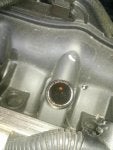2011-2016 Cruze 1.4L PCV Valve Cover/Intake Manifold Issues
Video:
I made a video to help better explain how this whole PCV system works to supplement this article.
Overview
I find myself having to explain this issue to someone almost daily, so in the interest of brevity, I'm creating a thread specifically for people to reference quickly if they have an issue.
The Cruze 1.4L Turbo engine has a terrible PCV check valve design that afflicts 100% of cars I have come across. It's not a matter of if, but when, it will fail. There are three primary components to this system that frequently fail: the PCV regulator diaphragm (some people call it a check valve) on the valve cover, the check valve in the intake manifold, and the corrugated hose going from the intake manifold to the turbo. We will focus on the first two, which are the most likely failures.
Symptoms
Depending on how long you've had this issue, your vehicle may throw a check engine light with any or all of the following codes (DTCs):
P0171
P0106
P1101
P0507
P0299
P2096
Note: lack of check engine light does not mean everything is operating correctly!
Your vehicle may also exhibit any or all of the following symptoms:
- Elevated oil consumption
- Smoke blowing through the tail pipe
- A hissing sound in the engine bay
- A rough/stumbling idle
- Loss of power
- Reduced fuel economy
Diagnosis
Valve Cover
With the engine running, inspect the vent on the PCV regulator diaphragm. The PCV regulator diaphragm has a round non-removable cap on the driver side of the valve cover. Remove the cosmetic cover off of the valve cover:
Underneath, you'll find the cap that covers the PCV regulator diaphragm. If this has failed, the engine will be sucking in air from here, and creating a hissing sound. Place your finger over this hole to cover it. If the engine RPMs change or the hissing stops, the valve cover needs to be replaced.
DON'T STOP THERE! Failure of the valve cover PCV regulator diaphragm may only be a symptom of a greater problem: the PCV check valve in the intake manifold. If the intake manifold PCV check valve has failed and you only replace the valve cover, you will find yourself replacing valve covers every few months not knowing why.
Intake Manifold PCV Check Valve
With the engine off, locate the corrugated hose coming out of the top of the PCV check valve:
With tightly gripped pliers, remove the clip holding the hose off by pulling it out:
Pull the corrugated hose off from the base, taking care not to pull from the hose itself as it may crack or tear. Using a flashlight, look inside the hole. If you are facing the engine bay from the front, there should be an orange/pink/peach nipple/valve on the "back" of that hole that looks like this:
If you don't see that check valve, use q-tips and rubbing alcohol to clean that area and check again. If you still don't see it, this must be addressed.
There's one final part that needs to be checked:
PCV Hose/Valve
In the last section, you need to remove a hose from the intake manifold. That hose has another check valve at the other end of it; at the turbo inlet. To verify its functionality, blow into the hose; it should blow freely. Suck air back through the hose; it should completely block airflow. If it doesn't do either of these, the whole thing needs to be replaced. Those hose also has a tendency to become brittle and crack, at which point it will also need replacing. Be sure to check this hose everywhere if you suspect it is leaking or are hearing a hissing sound in the engine bay.
Repair Solutions
Both of the above components are covered under your powertrain warranty. If your car is still under powertrain warranty, bring your car to the dealer and tell your dealer you are experiencing oil consumption of one quart per 1,000 miles and to reference GM Bulletin PIP5197C.
If the PCV regulator diaphragm on the valve cover has failed, replacement is required and will cost ~$60. Refer to this tutorial for replacing the valve cover. How-To: Replace the Valve/Camshaft Cover (1.4L Turbo)
If the check valve on the intake manifold is missing, you have three options:
1. You can replace the intake manifold with a new one. As of late early 2018, GM is phasing out the intake manifold that ships with all accessories and is selling a bare intake manifold. I don't yet have the part number for that.
2. Dorman has begun releasing an option. However, this option has the same check valve design as the GM manifold, meaning it will be prone to failure and boost leaks, and is not serviceable. The part number is 615-380, but availability is currently limited.
3. You can install one of my Intake Manifold PCV check valve fix kits for as little as $75, which is much cheaper than the Dorman intake (after shipping) while providing you a more robust, leak-free, and durable check valve. My external check valve design allows for easy (doesn't require removal of the intake manifold) servicing and cleaning, and inexpensive replacement. Details are in this thread: GM 1.4L Turbo Intake Manifold PCV Valve Fix Kits
A tutorial for removing the intake manifold is located here: How-To: Remove 2011-2016 Cruze 1.4L Intake Manifold
If the check valve at the turbo inlet has malfunctioned or the hose is cracked, you will need to replace it: ACDelco 25193343 PCV Pipe with Valve
Resources
To learn more about this engine's PCV system, refer to the following thread: 2011-2016 Cruze Limited 1.4L PCV System Explained





